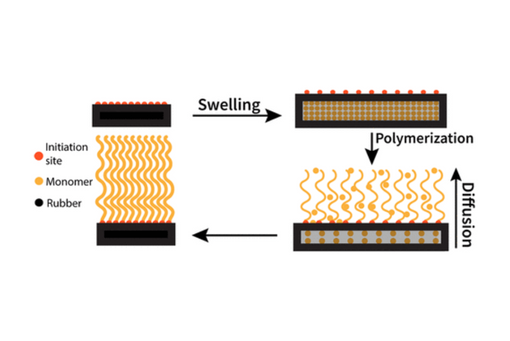Surface-Initiated Passing-Through Polymerization on a Rubber Substrate: Supplying Monomer from Swollen Substrates
Abstract
Passing-through polymerization is a technique for growing surface-initiated polymer brushes where monomers are supplied to the growing chains by diffusing through the initiator-functionalized surface. This inverts the monomer concentration gradient relative to conventional grafting-from mechanisms, allowing for the synthesis of thicker and more densely packed brushes. Here we use a combination of coarse-grained computer simulations and experimental techniques to demonstrate how this approach can be implemented, with swellable network-like substrates supplying monomers to the functionalized surface as they diffuse out of the swollen network. Compared to grafting-from polymer brushes, this method shows a higher contact angle and a greater brush mass. Additionally, we observed that the passing-through approach could lead to strain-induced crystallization in the brush layer or wrinkling of the brush surface, which we used to estimate the brush thickness. The developed method opens a path for large-scale synthesis of the brush-modified elastic substrates.
Citation
McDermott, S. T., Ward, S. P., Vy, N. C., Wang, Z., Morales-Acosta, M. D., Dobrynin, A. V., & Adamson, D. H. (2022). Surface-initiated passing-through polymerization on a rubber substrate: Supplying monomer from swollen substrates. Macromolecules, 55(16), 7265–7272. https://doi.org/10.1021/acs.macromol.2c00685


